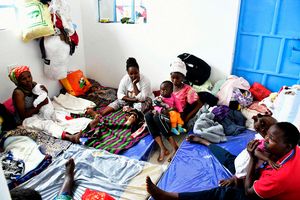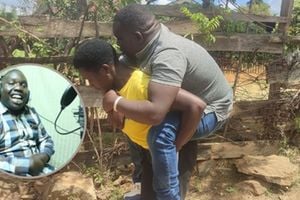
Mother's Day can be a very depressing time for those who lost their mothers at a young age and grew up without a mother's love.
They say what you do not know won’t hurt you. However, for Doris Wako, 41, the hurt has been going on for over four decades. Yes, she does not know what a mother’s love is and based on this premise it shouldn’t hurt her, but that is what hurts her most. She believes that the pain will never disappear as the world around her keeps creating scenes that make her miss her mother’s love every day.
“I learned that my mother had died when I was in Class Four. At that time, I was sickly and I overheard somebody asking whether my health was deteriorating because I had not been breastfed. I got curious and when I asked my elder sister, to my utter shock she said, “Our mother is not alive.”

Doris Wako, mother of five poses for photo in Busia on May 8, 2024. Her mother died some minutes after she was born.
Doris’s mother died in hospital just moments after giving birth to her, and she was raised by her stepmother. At the time, her elder sister was five years old while her other sibling was two. As a child, she had no idea that the person she called ‘mum’ was not her biological mother.
“There is a photo where my mother is standing together with my stepmother and my dad. It is a black-and-white photo where my mum looks really beautiful. Every time I look at it, I miss her terribly and wish that she carried me in her lap in that photo so that I can always feel her presence in my life,” says the lastborn in a family of three. That is the only available photo of her late mother, which is placed on a prime page in her aunt’s family album.
She has since been told that her mother was a welcoming woman who used to host visitors at her home, a virtue she sees in herself. Evidence of this is the more than 30 vulnerable children she has taken under her care. She also understands that her mum was a poultry keeper and indigenous vegetable farmer, activities that she does passionately at her Busia home to ensure that her family does not lack food.
Polygamous family
Growing up without a mother, she says, was very challenging considering her big polygamous family setup. She and her siblings were mostly under the care of her stepmother since her dad was a civil servant who used to work far away from home. However, she was lucky to finish school and secure a job at the National Police Service where she worked alongside her husband.
Getting married opened a new chapter in her life, as she found love, and a new home. She hoped she would someday forget about her childhood and the deep void she felt for lacking a mother’s love, but no such thing happened. She continued living filled with a great fear of death.
“When I got married people told my husband that I would also die while giving birth like my mother. In my first pregnancy I prayed a lot. I prayed like a mad woman. And when I gave birth people said I would die while delivering the second child, but we ended up having four children,” she says proudly.
With a job at hand, young children to take care of and a university degree to complete, Doris and her husband, who all along had been in a traditional marriage, decided to officiate their marriage. Little did she know that the wedding would lead her into a period of depression that saw many close friends abandon her.
“Two weeks after my wedding, my husband died and people said that it was against tradition to have my stepmother walk me down the aisle. That pained me a lot and I missed my mother all the more. I knew that if my mother had been alive, then she would have been the one to walk with me on my wedding day and my husband would not have died under such unclear circumstances,” says the mother of five.
Slipped into depression
As she struggled to cope with her husband’s death, life became hard, and with no shoulder to lean on, she slipped into depression. Eight months later, she resigned from the National Police Service where she had served for 13 years and was awarded a Head of State Commendation in 2018.
During this period, Doris tried her best to maintain a can-do attitude but it was hard to offer her children the lifestyle they were used to before the death of her husband. In the 2022 general elections, her efforts to become Busia County Senator ended in futility as she lost on the ballot.
“The government should follow up on children whose mothers have died at birth. I am told that 15 minutes after my mother gave birth to me, she said she was thirsty and was offered cold drinking water. After she drank the water she died. She was bleeding profusely at the time. The government should find ways of reducing cases of mothers dying while delivering because children left behind like me suffer a lot,” she says.

Purity Kanji, mother of three poses for a photo at her Denderu home on April 26, 2024. Her mother died when she was six months old
Doris’s story is not unique. For years, Purity Kanji, 37, did not have a clue who her mother was. It was not until her father died 20 years ago that her elder brother found a black and white negative photo of their mother inside some documents. Her mother died of breast cancer when she was six months old, too young to sit by herself or chew food.
“When my firstborn turned six months, I cried a lot because she reminded me of my age when my mother died. I felt pain on behalf of my dad. He was blind and I only imagined how much of a struggle it was for a person living with disability to have to dress me and change my napkins whenever I soiled them,” says the mother of three.
Purity’s firstborn has enrolled in university, with the second born being in Grade Eight and the last born in Grade Three. She says she has observed that all her children took their first steps after they turned eight months, an indication that her mother died before she learned anything from her.
Mother’s Union uniform
“The first day I walked into church dressed in Mother’s Union uniform, church members who were friends with my mother and participated in raising me cried. They told me that my mother’s prayers had been answered and that shows me that my mother was a God-fearing woman who was admired for her church services,” says the Mother’s Union secretary at ACK Wangunyo Parish.
She believes that her late mother was also a hardworking woman, as evidenced by the title deed she had for a parcel of land their home sits on in Ngong. Her three siblings, who were much older at the time of their mother’s death, describe her as a polite mother who never picked fights with anyone.
“My mother left us with a place we could call home and I am convinced that had she not died when she did, she would have given us a better life than the one I had. Perhaps I could have pursued a career at a university that could have helped me get a job in a big company,” says Purity, who now earns a living from dairy, crops, vegetables, and pig farming in Ndenderu.
Beyond the life challenges Doris and Purity have gone through, they believe that the fact that their mothers died while they were babies equally affects them as mothers. They admit that their motherhood is based on a trial-and-error method as they have no one to look up to.
Aisha Karanja, a sociologist, advises those who may have grown up without a mother to perform their parenting duties without being obsessed with whether they are doing the right or wrong thing. She says that no school teaches how to be a good mother, and that there is no measure for good or bad motherhood.
Parenting style
“Every mother has a different parenting style. While a mother figure is important, it is does not determine how her daughter will bring up her own children. Don’t let your past determine your future and you can do this by exercising mind growth rather than being pathological in your thinking,” says Aisha.
She recognises that orphans face life issues that require therapy to help them adjust to their realities so they can focus on thriving in life. According to her, this affects how parents raise their children.
“Unfortunately, our society is very problematic. People want to know the ‘why’ without caring about the ‘what’. You can start from where you are in parenting and change everything because the future is still in your power,” Aisha says.
As the world celebrates Mother’s Day this weekend, she advises those praising their mothers to be considerate of orphans like Doris and Purity.
Doris now runs a brick-making business. Her life has been full of challenges and she wishes every day that her mother was alive.
“I spend time in the forest where I make bricks and get back home very exhausted. Once ready, I sell bricks in the market to earn money for food, clothes, and school fees. Sometimes I wish my mother was still alive so that I could take my children to her and I go to the city to look for a decent job,” says the former police officer.










